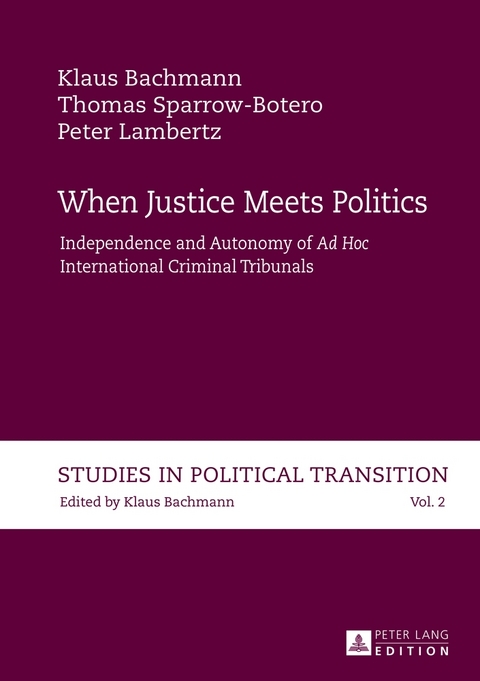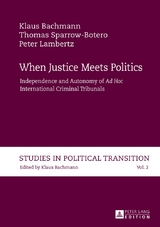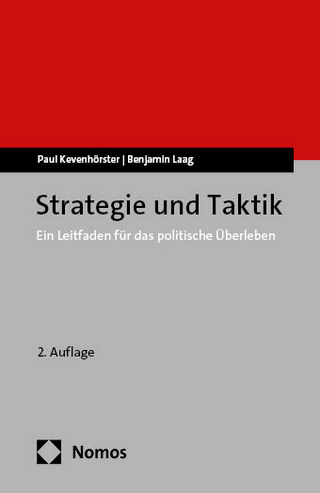When Justice Meets Politics
Peter Lang Gmbh, Internationaler Verlag Der Wissenschaften
978-3-631-63356-4 (ISBN)
Are the International Criminal Tribunal for the former Yugoslavia (ICTY) and the International Criminal Tribunal for Rwanda (ICTR) independent actors, who mete out fair and un-biased justice, or instruments of a new world order, which execute the will of the most powerful states? By applying process tracing and frame analysis, this book reveals the interplay between the power politics of states, the agenda setting power of international criminal tribunals and the scope of the autonomy which the tribunals, the prosecutors and judges enjoy - and how they make use of it. The book details the mechanisms that govern judicial behaviour at the ICTY and the ICTR as well as the influence of the media, non-governmental organisations, governments and international organisations on judges and prosecutors. Last but not least, it shows why and how initially controversial frames like those about the "genocide in Srebrenica" and "the Rwandan genocide" became almost undisputed notions which are hardly challenged by anyone today.
Klaus Bachmann is a professor of political science at the University of Social Sciences and Humanities in Warsaw. He was an observer at the ICTY during the trials of Biljana Plavsic and Slobodan Milosevic. Thomas Sparrow-Botero is a journalist and translator. He currently works for the BBC in the United States. Previously, he reported on Central and Eastern European topics for Latin American media outlets. He covered, among other events, the judgement of Ante Gotovina and the capture of Ratko Mladic. Peter Lambertz is a PhD candidate at the University of Leipzig. He holds a Licence en Histoire from the Université Libre de Bruxelles and an MA in Global Studies from the universities of Leipzig and Wroclaw.
Contents: International Criminal Tribunals - Justice - Politics - Reconciliation - Europeanisation - International Organisations - European Integration - EU Enlargement - Framing - Agenda Setting - Rwanda - Genocide - Yugoslavia - Croatia - Serbia - Srebrenica - United Nations - France - The Netherlands - United States - Belgium - Security Council - Rhetorical Action - Theories of Justice - Judicial Behaviour.
«This book offers a valuable reading and an important empirical test of optimistic expectations of Tribunals' independence and contribution in transitional justice. It reveals a novel insight into the several aspects of contested relation of justice vs. politics in global arena and sets new approaches in dealing with the subject.» (Katarina Ristic, H-Soz-u-Kult 11/2013)
«This book offers a valuable reading and an important empirical test of optimistic expectations of Tribunals' independence and contribution in transitional justice. It reveals a novel insight into the several aspects of contested relation of justice vs. politics in global arena and sets new approaches in dealing with the subject.» (Katarina Ristic, H-Soz-u-Kult 11/2013)
| Erscheint lt. Verlag | 31.1.2013 |
|---|---|
| Reihe/Serie | Studies in Political Transition ; 2 |
| Verlagsort | Frankfurt a.M. |
| Sprache | englisch |
| Maße | 148 x 210 mm |
| Gewicht | 610 g |
| Themenwelt | Kunst / Musik / Theater ► Theater / Ballett |
| Sozialwissenschaften ► Politik / Verwaltung ► Allgemeines / Lexika | |
| Sozialwissenschaften ► Politik / Verwaltung ► Politische Systeme | |
| Sozialwissenschaften ► Politik / Verwaltung ► Politische Theorie | |
| Sozialwissenschaften ► Politik / Verwaltung ► Vergleichende Politikwissenschaften | |
| Schlagworte | Autonomy • Bachmann • Botero • criminal • Croatia • European Integration • Genocide • Human Rights • Independence • international • International< • Justice • Klaus • Lambertz • meets • Peter • Politics • Rwanda • serbia • Sparrow • Thomas • Tribunals • War Crimes • when • Yugoslavia |
| ISBN-10 | 3-631-63356-4 / 3631633564 |
| ISBN-13 | 978-3-631-63356-4 / 9783631633564 |
| Zustand | Neuware |
| Haben Sie eine Frage zum Produkt? |
aus dem Bereich




